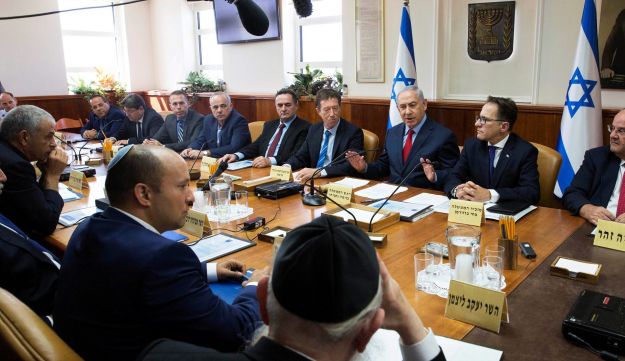Tel Aviv – Israeli Prime Minister Binyamin Netanyahu’s bureau chief Yoav Horowitz have requested that the Jewish National Fund (JNF) help raise 4 billion Israeli Shekel ($1.14 billion) for defense and military budget.
An audio recording of a secret session held two weeks ago was revealed, during which Horowitz was heard requesting the money from the organization to help the state fill gaps in its defense budget.
“The Israeli government, and especially the various security forces, reached the conclusion that the State of Israel needs an additional NIS 4 billion. I will only talk about what you all know, including the Iranian threat and the threat in the north – all of this brings the security forces to request another NIS 4 billion,” said Horowitz.
He indicated that the prime minister, the defense minister and the security forces are deliberating this dilemma and trying to stretch the budget to see where the funds can be raised.
An informed political source revealed that Netanyahu and Defense Minister Avigdor Lieberman are behind this request, adding that the Israeli Army is not concerned to reconsider the financial agreements with the Ministry of Finance. He added that the security budget is already doubled.
The Defense Ministry and the Finance Ministry have been discussing for months funding the amounts set two years ago, and that’s why Lieberman went straight to Netanyahu discussing the need for an additional 4.5 billion shekels ($1.3 billion), according to military sources.
The sources also stated that Lieberman informed the PM that the new strategic reality in the region, with a stronger Russia, a revived Assad, and a bigger Iranian threat, mandated the extra funds. He explained that the “demands in question are based on contingency plans that are nothing new and do not stem from a war or emergency military operation.”
In 2015, former Defense Minister Moshe Ya’alon and Finance Minister Moshe Kahlon signed a memorandum of understanding between their ministries that covers the years 2016 to 2020.
Some of the details of this deal remain classified, but based on the information to give the media, it promised a stable budget for those five years.
Both ministries and Chief of Staff Lt. Gen. Gadi Eisenkot agreed that the army’s portion of the defense budget would remain fixed at about 31 billion shekels ($8.8 billion). For the defense budget as a whole, the agreement set a baseline of 56.1 billion shekels a year in addition to US defense aid ($3.8 billion a year from 2019). The total budget is expected to reach about 70 billion shekels a year.
When asked about the budget issue, a Defense Ministry senior official replied: “Haven’t you heard the threats of Iran’s Chief of Staff during his visit to Syria?”
Chief of Staff of Iran’s armed forces Maj-Gen Mohammad Bagheri indicated Wednesday that Tehran would not tolerate violations of Syrian sovereignty by Israel and vowed that the two countries would jointly fight against Syria’s enemies.
“We cannot accept a situation where the Zionist entity attacks Syria from the ground and the air,” Bagheri said his visit to Damascus, Syria.
He said he was in the Syrian capital to coordinate and cooperate “in order to fight our common enemies, whether they are the Zionists or the terrorists. We discussed ways to strengthen relations in the future and outlined the basic principles of this cooperation.”
Lieberman responded to Bagheri’s statement saying that Iran was attempting to spread its control into Syria and establish a military presence in a quest to become the dominant regional power.
“We won’t allow this. We have the tools to cope with this challenge,” reiterated Lieberman.
Sources close to Lieberman stated that he is concerned over the recent developments in the region including the instability and Hezbollah’s mobilization with the support of Iran. He added that Assad regime’s field advancements could lead to the reformation of the Syrian Army.
The Defense Minister also has fears that the army might not be fully prepared, according to the sources.
On Thursday, Lieberman flew to Washington to meet Defense Secretary James Mattis for talks on Iran and other regional issues. Sources stated that Israel is keen on fully coordinating with Washington to face Iran’s threats.
Russian Defense Minister Sergei Shoigu visited Israel on Monday and held meetings with Defense Minister Avigdor Liberman and Prime Minister Benjamin Netanyahu. Israeli leadership had been trying to recruit Russia as well against Iran’s power.
